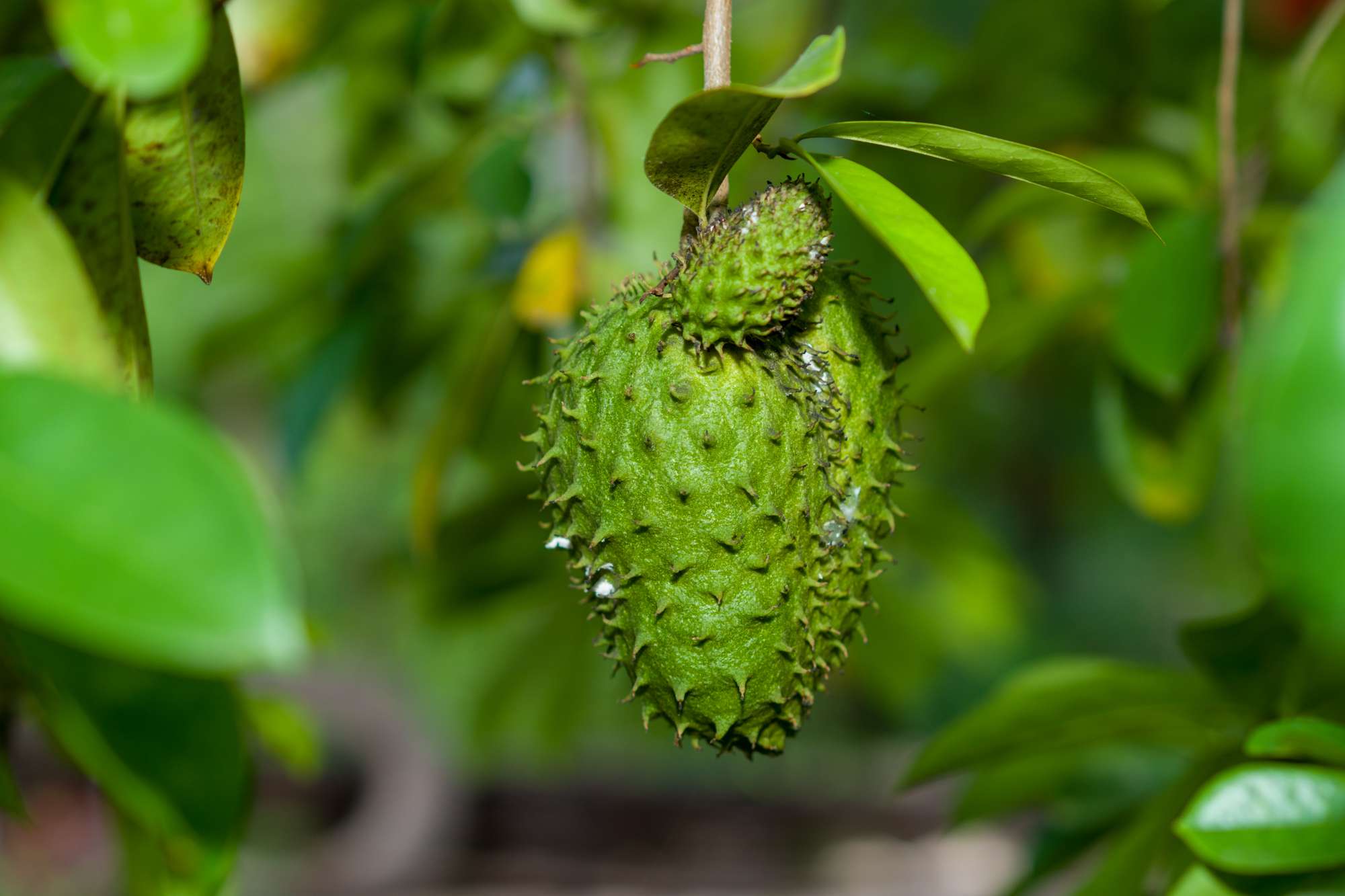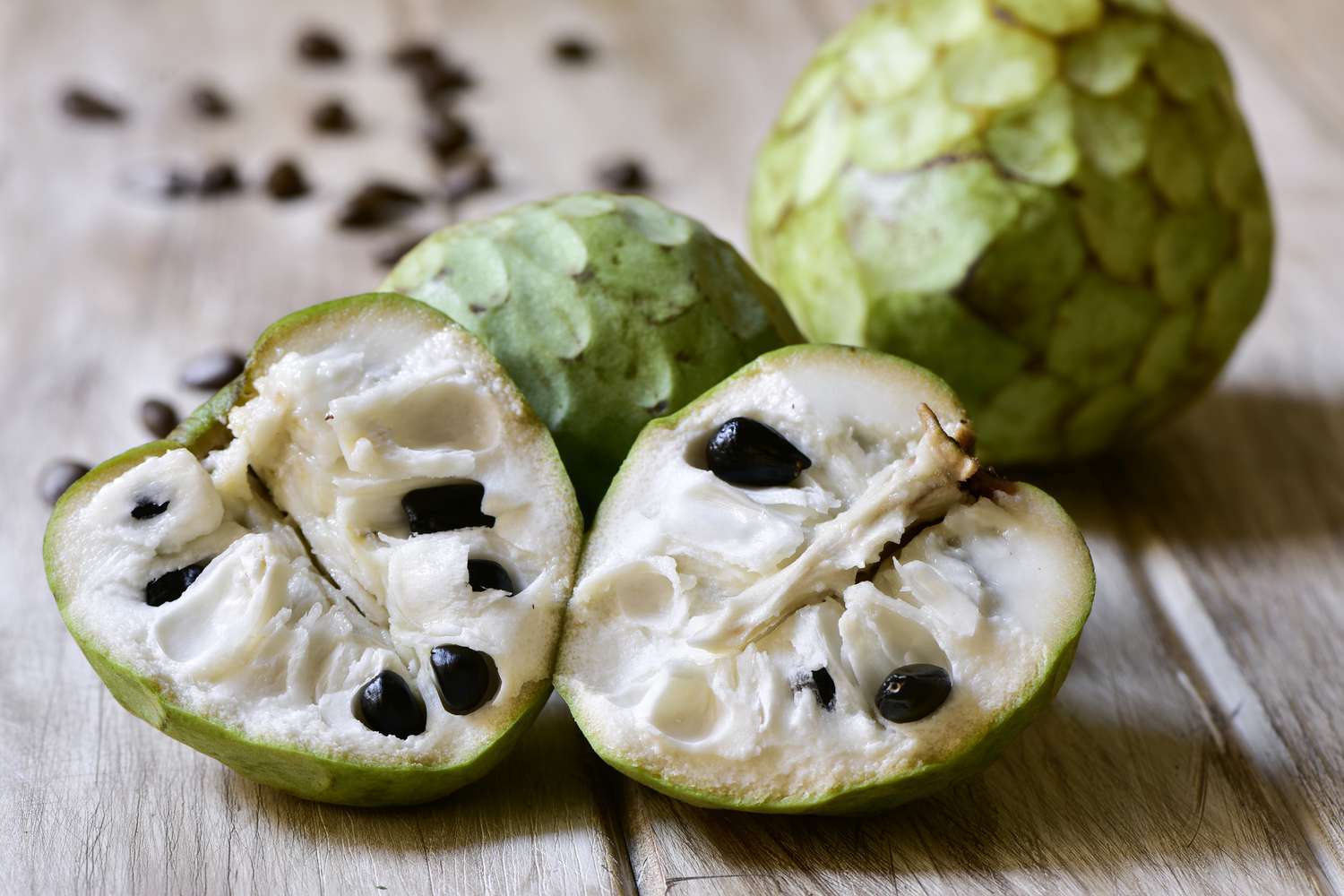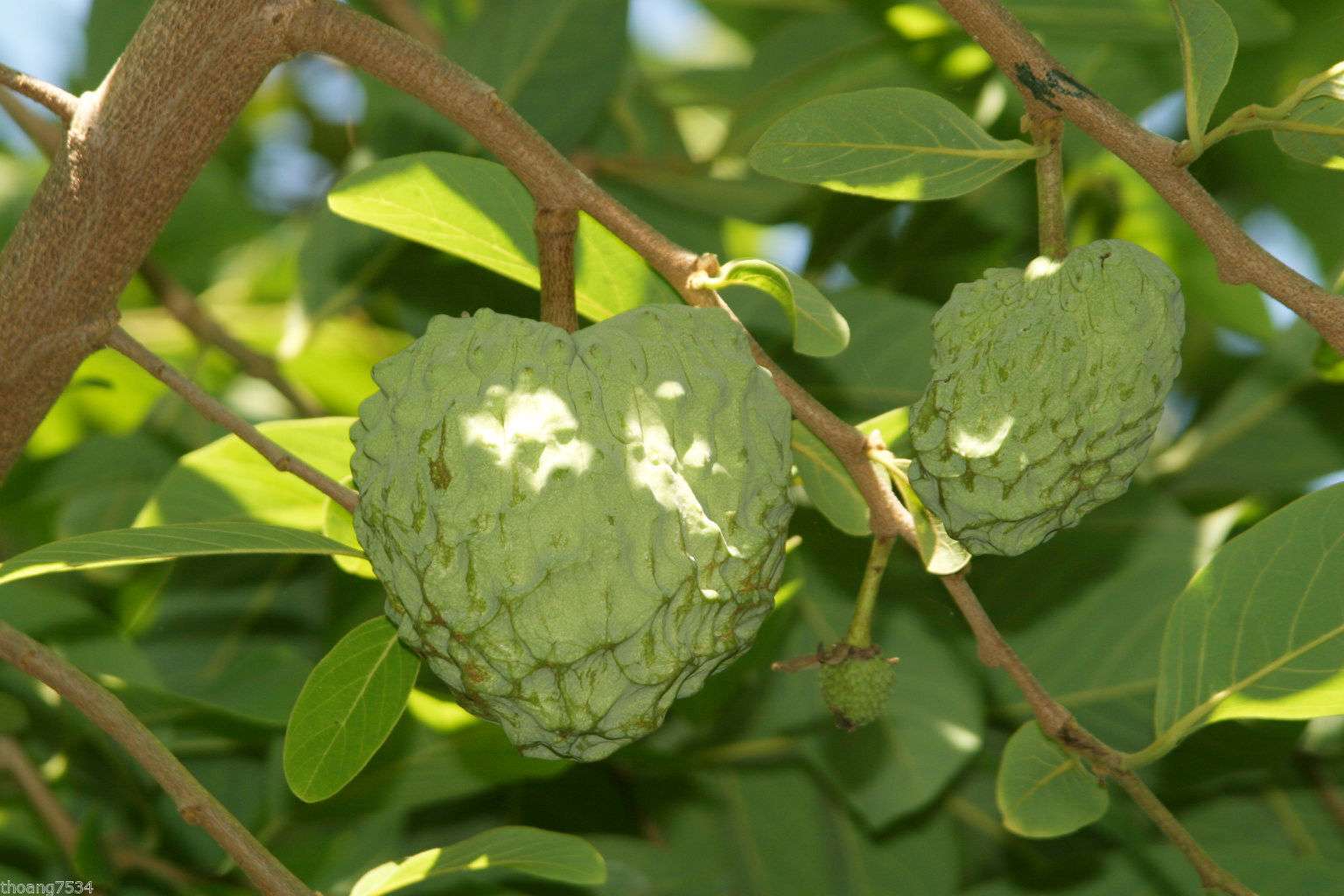Sweetsop (annona squamosa) is an excellent source of phytochemicals and antioxidants
Sweetsop (annona squamosa) is an excellent source of phytochemicals and antioxidants
Considered a very healthy fruit due to rich in minerals like iron, manganese, magnesium, calcium, potassium, and phosphorus. Among vitamins, it has significant amounts of vitamin A, B1, B2, B3, B5, B6, and B9 as well as slightly more vitamin C than grapefruit. It's also an excellent source of phytochemicals and antioxidants.
Sweetsop's scientific name is annona squamosa. It is also known sugar apple or custard apple.
Annona squamosa is a tropical species native to the West Indies, South and Central America, Ecuador, Peru, Brazil, India, Mexico, Bahamas, Bermuda, and Egypt. It tolerates a tropical lowland climate better than its relatives annona reticulata and annona cherimola. Annona squamosa grows as a small sapling, rising from 3 m and reaching up to 8 m, with large, randomly spread branches having brownish or light brownish bark with thin leaves.
Annona squamosa has been utilised as a natural medicine and in various other food applications, e.g., its pulp is utilised as a flavouring agent in ice cream, and 50–80% of sweetsop fruit is edible and can be pulped as juice. It contains appreciable vitamin C in the range of 35–42 mg per 100 g, and dietary fibre, vitamin B1 (thiamine), and potassium contents are also notably high.
Sweetsop fruit has many seeds which are coated with the flesh is fragrant and sweet, creamy white through light yellow, and resembles and tastes like custard. Due to the soft flesh and structure of the sweetsop, it is very fragile to pressure when ripe.
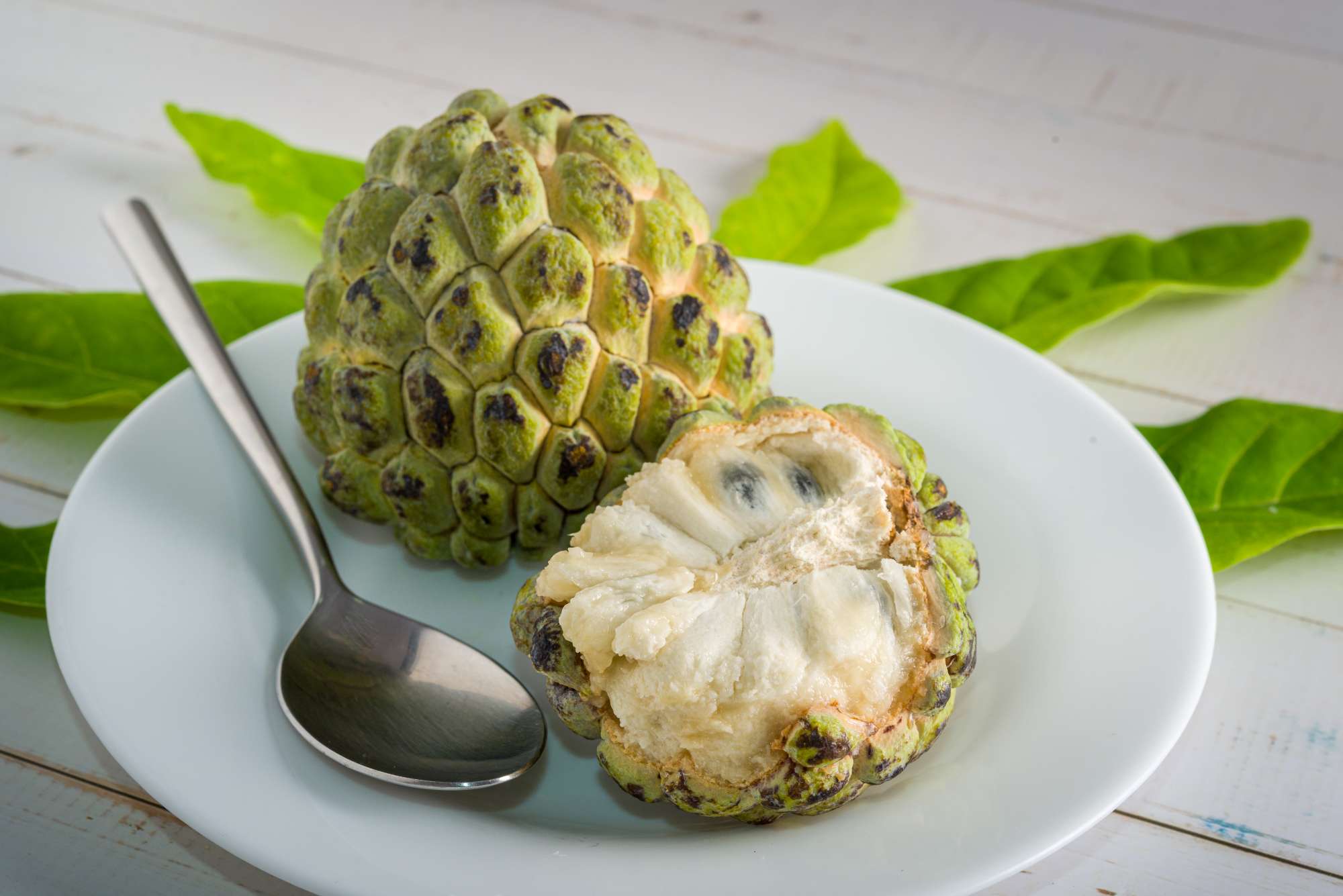
NUTRITIONAL VALUE
In 100 grams of Soursop fruit flesh contains:
- Energy: 94 kcal
- Carbohydrates: 23.64 g
- Dietary fiber: 4.4 g
- Fat: 0.29 g
- Protein: 2.06 g
Vitamins:
Vitamin A: 33 IU
Thiamine (B1): 0.11 mg, 9%DV†
Riboflavin (B2): 0.113 mg, 9%DV†
Niacin (B3): 0.883 mg, 6%DV†
Pantothenic acid (B5): 0.226 mg, 5%DV†
Vitamin B6: 0.2 mg, 12%DV†
Folate (B9): 14 μg, 4%DV†
Vitamin C: 36.3 mg, 40%DV†
Minerals:
Calcium: 24 mg, 2%DV†
Iron: 0.6 mg, 3%DV†
Magnesium: 21 mg, 5%DV†
Manganese: 0.42 mg, 18%DV†
Phosphorus: 32 mg, 3%DV†
Potassium: 247 mg, 8%DV†
Sodium: 9 mg, 0%DV†
Zinc: 0.1 mg, 1%DV†
THE HEALTH BENEFITS
There are many potential health benefits of sugar apples. These are some of its major ones:
1. Improving skin health
Sweetsop has been shown to prevent acne and pimples, decrease sebum (oil) production, and clear the pores of the skin. It may make the skin more radiant and smooth.
Sweetsop is loaded with antioxidants. These compounds can protect the skin cells from damage, thereby making your skin shinier. It also help to reduce signs of aging and improve the appear of wrinkles. Additionally, sweetsop fruits have a good amount of vitamin A, which plays a major role in collagen (a type of protein) production and strengthening your muscles. Collagen helps elasticity to the skin.
2. Boosting immunity
The vitamin C in sweetsop fruits not only offers antioxidant benefits but also helps to boost your immune system. This vitamin helps your white blood cells function better, improves your skin's defenses, and helps your body fight infections. This is why people in Yucatan still use sweetsop for treating chills and fever. For the same reason, the Amazonians also use them in cough syrups.
3. Preventing cancer
Various lab studies have shown that sweetsop fruits may show anticancer activity in form of their crude extracts and isolated compounds. This anticancer activity of sweetsop fruits could help minimize the growth of breast cancer in patients with no reports of side effects during the study. The leaf extract showed potential to reduce the spreading of cancer cells and also shows toxic effects on cancer cells, it is best to consult a doctor before using any fruits or vegetables for health conditions like cancer.
4. Preventing heart problems
Sweetsop fruits are rich in potassium. By balancing the sodium levels in your blood, this micronutrient can lower your blood pressure, improving your heart health. The high magnesium content in sweetsop also works to support your heart. It helps balance the pressure on the muscles of your heart, which causes them to relax. This in turn lowers your chances of having a heart attack.
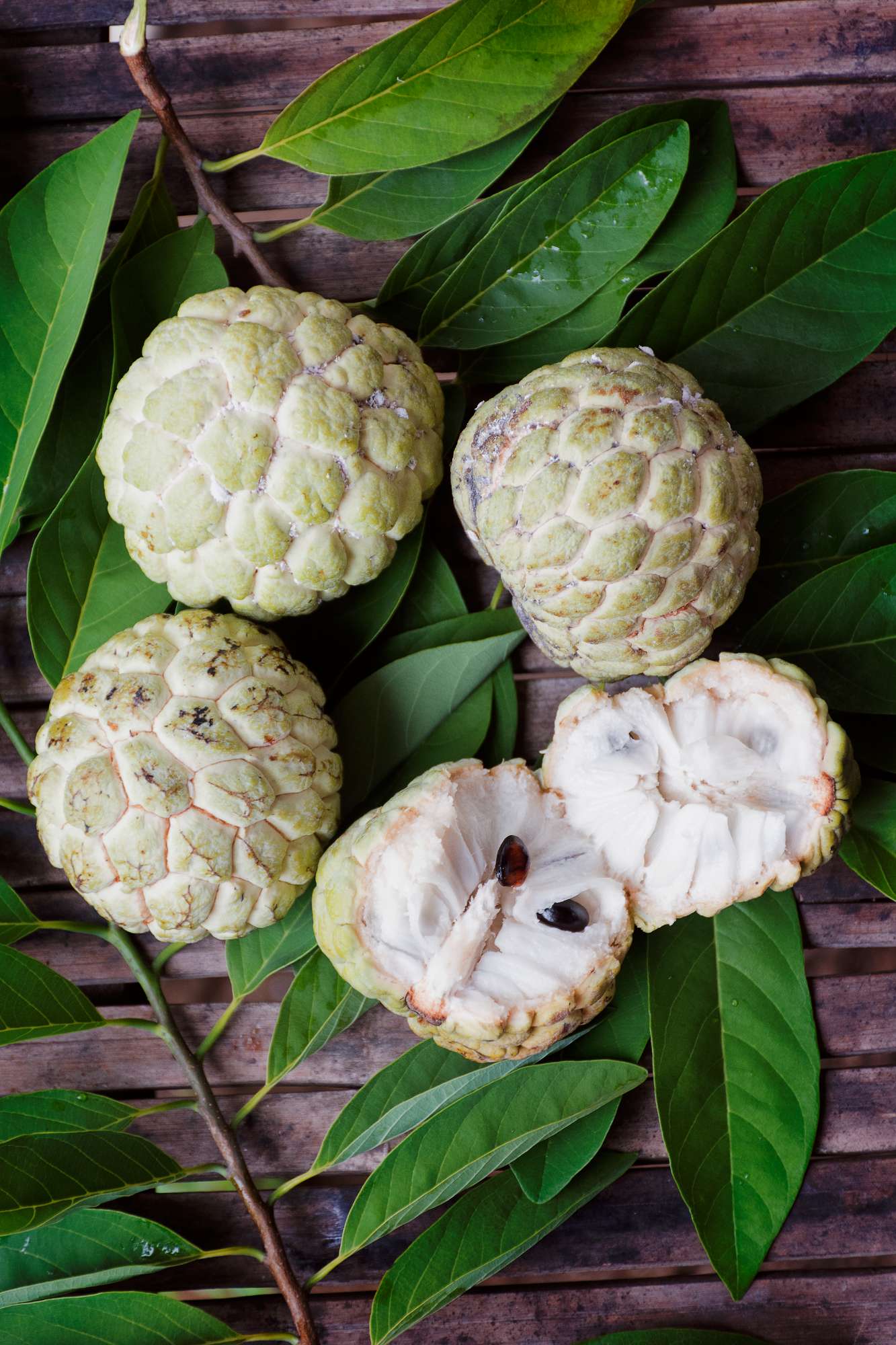

SIDE EFFECTS OF SWEETSOP
According to studies, the side effects of sweetsop are given as follows:
- A study confirmed that atypical Parkinsonism develops in people after consuming sweetsop daily due to the presence of bioactive compounds in the fruit. It is a condition that has symptoms similar to Parkinson’s disease, recognised by postural instability.
- Phytochemicals present in the sweetsop may lead to brain lesions, which can affect the brain tissue, ultimately causing brain diseases.
- Sweetsop may produce rashes in sensitive individuals.
If you experience any adverse reactions to it, immediately contact your doctor. They will be able to treat you appropriately.
DID YOU KNOW?
Recent articles have demonstrated that various plant byproducts, such as fruit or vegetable pomace, bran/husk/seed coat, seeds, peel, and leaves, are important source of phytochemicals and can be utilised as innovative ingredient in foods. Extracts obtained from various sections of the Annona squamosa plant, such as its bark, roots, leaf, stem, fruit, peel, and seeds, have been utilised in traditional pharmacological applications in different countries to cure a variety of diseases, such as dysentery, epilepsy, haemorrhage, fever, and tumours. Annona squamosa seed powder is utilised to abolish lice, leaf extract is used to pacify boils and treat ulcers, and the fruit acts as a sedative in cases involving heart ailments and can be used to alleviate vomiting and treat tumours. Phytochemical studies have revealed that custard apple contains numerous phenol-based compounds, e.g., proanthocyanidins, with 18 different phenolic compounds, mainly alkaloids or flavonoids. Apart from fruit, large amounts of leaves are generated during pruning, which causes complications related to their disposal for farmers. Annona squamosa leaves (ASLs) possess valorisation potential owing to their extensive pharmacological properties and biological activities, such as antioxidant, antimicrobial, antidiabetic, antiviral, anticancer, and hepatoprotective activities. These activities are caused by the presence of glycosides, phytosterols, carbohydrates, oils, saponins, tannins, alkaloids, phenols, flavonoids, peptides, and various acetogenin compounds. Phytochemical assessments have emphasised that numerous active compounds, such as acetogenins and flavonoids, present in Annona squamosa also give rise to plant cytotoxic, antimalarial, antidiabetic, and immunosuppressive activities. Extract of ASLs helps maintain plasma insulin and lipid profiles and can significantly reduce blood glucose and lipid peroxidation. The existing literature on Annona squamosa lacks extensive compilation of pivotal information on its phytochemical, nutraceutical, and biological activities. Hence, the present review is a sincere effort to aggregate crucial information regarding the nutritional, pharmacological, and biological aspects and activities of ASLs.
Compiled and written by Crocus Media
Products

Negin Saffron Mashhad
Saffron Negin Salam is grown in the high mountains of the Mashhad region, where the air is fresh. Saffron is watered with dew, due to resistant to the dry wind blowing in the summer, so the surviving plants have the most intense vitality.
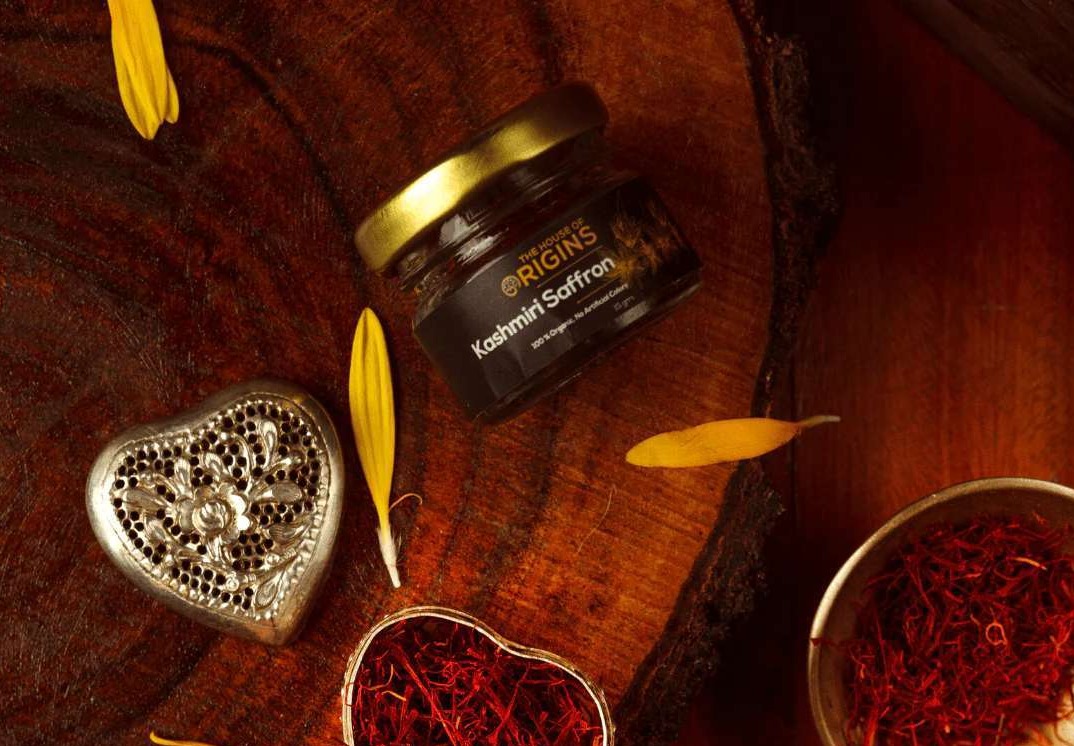
Negin Saffron Kashmiri
Negin Saffron from The House of Origins is legally sourced with high quality. There are a plethora of famous saffron raw material areas, but the Kashmiri pistil from India has a better quality because the climatic and soil conditions are more suitable for them. Each Kashmiri saffron has 3 delicate branches of saffron that are skillfully hand-picked by the local Lethapora farmer community to bring you the original and pure 'red gold'.
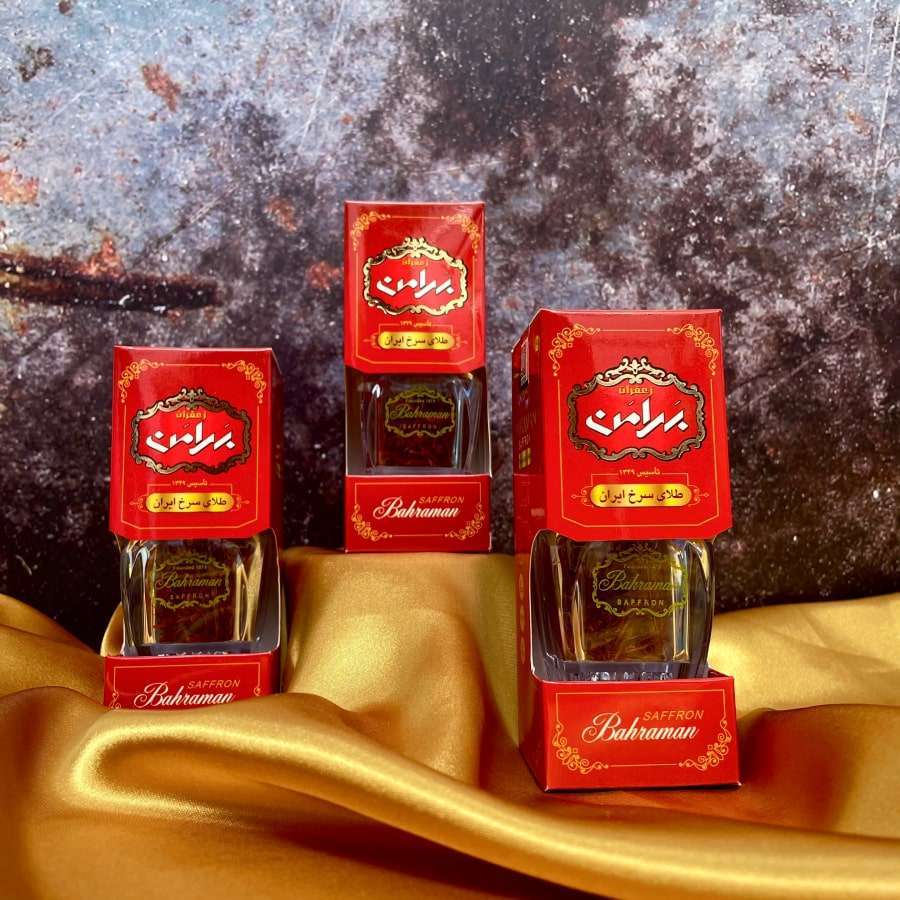
Negin Saffron Iran
Negin Saffron Bahraman is a dried saffron pistil produced by Bahraman Saffron Iran company. Saffron Bahraman is known as one of the most valuable and expensive herbs in the Middle East. Bahraman products are the output of a growing, cultivating and harvesting process that uses a limited amount of fertilizer. Therefore, bahraman saffron still ensures high quality, retains aroma and high nutritional content to ensure safety for users.
